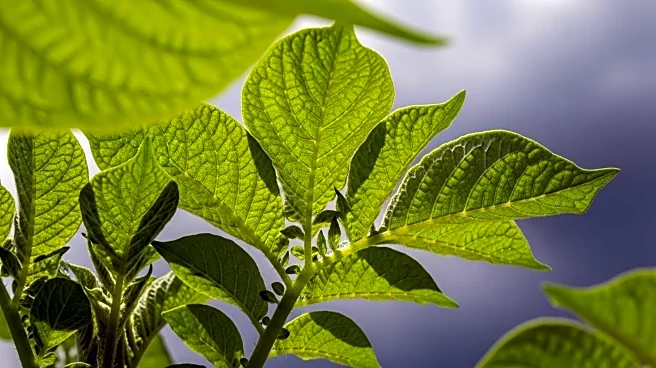What's Happening?
The Agricultural Research Council (ARC) has identified a new leaf disease affecting potato crops in South Africa, caused by the pathogen Colletotrichum coccodes. Previously considered a post-harvest issue, this pathogen is now impacting potato foliage in the field, resembling early blight symptoms. Dr. Elsie Cruywagen, a specialist researcher in crop protection at ARC, highlighted the importance of monitoring and testing for this pathogen during the Potatoes SA Innovation Symposium 2025. The ARC is urging farmers to submit samples for further research and testing, as the pathogen's presence on living plants marks a significant development. The ARC is also addressing other common leaf diseases, such as potato late blight, which remains under control but could reach epidemic levels under favorable conditions.
Why It's Important?
The emergence of Colletotrichum coccodes as a field pathogen poses a new challenge for potato farmers, potentially affecting crop yields and economic stability in the agricultural sector. The disease management strategies discussed by Dr. Cruywagen, including integrated disease management and fungicide rotation, are crucial for maintaining sustainable production. The ARC's research and collaboration with Potatoes SA are vital in developing effective control measures and preventing widespread crop damage. This development underscores the need for innovation and adaptation in agricultural practices, particularly in the face of climate change and evolving pathogen populations.
What's Next?
Farmers are encouraged to send samples of affected plants to the ARC's Plant Health and Protection Research Institute for further analysis. The ARC will continue its research to better understand the pathogen and develop effective management strategies. The collaboration between ARC and Potatoes SA will focus on testing fungicides and exploring integrated disease management approaches. Farmers will need to stay vigilant and adapt their practices to mitigate the impact of this new threat, ensuring the sustainability of potato production in the region.
Beyond the Headlines
The detection of Colletotrichum coccodes in potato fields highlights the broader implications of climate change on agriculture, as shifting pathogen populations require new approaches to disease management. This situation emphasizes the importance of data-driven agricultural practices and collaboration among researchers, farmers, and industry stakeholders to address emerging challenges. The need for sustainable and innovative solutions in crop protection is increasingly critical as environmental conditions continue to change.












